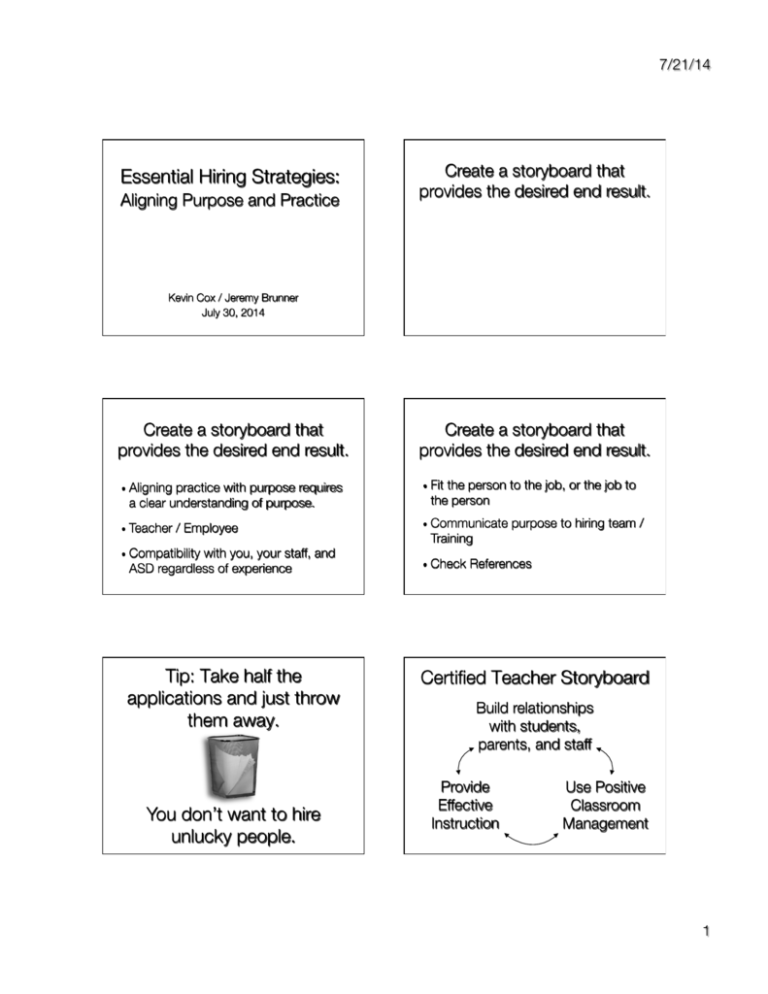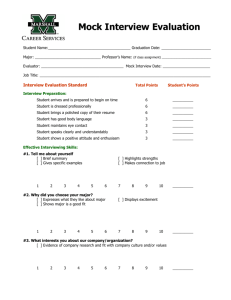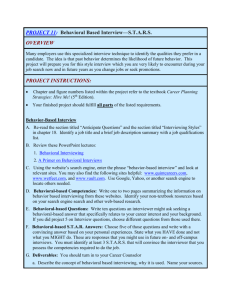
http://humanresources.about.com/od/interviewing/a/behavior_interv.htm?p=1
Human Resources
Use a Behavioral Interview to Select the Best Employees
How To Prepare for a Behavioral Interview
By Susan M. Heathfield
Want to know the best way to identify whether a candidate's
characteristics and motivations match the behaviors needed for your
job? A behavioral interview is the best tool you have to identify
candidates who have the behavioral traits and characteristics you
believe are essential for success in your open job.
Additionally, in a behavioral interview, you ask the candidate to
pinpoint specific instances in which a particular behavior was exhibited
in the past. In the best interviews, the candidate is unaware of the
behavior the interviewer is verifying.
The actual interview is preceded by behavior trait identification and a
job description1. The upfront work makes the interview effective and
successful. Here's what you need to know about how to prepare for
Seek Examples in a
Behavioral Interview
and conduct a behavioral interview.
Joshua Hodge Photography
How to Conduct an Effective Behavioral Interview
Start your preparation for a behavioral interview by identifying what you want the employee to be able to do in the open job. Use a job specification2 and
write a job description to describe the requirements of the position.
Determine the required outputs and performance success factors for the job.
Determine the characteristics and traits of the individual whom you believe will succeed in that job. If you have employees successfully performing the
job currently, list the traits, characteristics, and skills that they bring to the job.
Narrow the list to the key behavioral traits you believe that a candidate needs to be able to perform the job.
Write a job posting3 that describes the behavioral characteristics in the text. Make sure the characteristics or requirements section of your job description
lists the same behavioral characteristics.
Make a list of questions, both behavioral and traditional, to ask each candidate during the behavioral interview. A structured list of behavioral interview
questions makes candidate selection more defensible and allows you to make comparisons between the various answers and approaches of your
interviewees.
Review the resumes, cover letters4, and other job application5 materials you receive, with the behavioral traits and characteristics in mind.
Phone screen6 the candidates who have caught your attention with their qualifications, if necessary, to further narrow the candidate pool. You want to
schedule the most qualified candidates for a behavioral interview.
Schedule interviews with the candidates who most appear to have the behavioral characteristics, along with the skills, experience, education, and the
other factors you would normally screen for in your application review.
Ask your list of behavioral and traditional questions of each candidate during the behavioral interview.
Narrow your candidate choices based on their responses to the behavioral and traditional interview questions. Complete the selection process using these
recommended steps7.
Select your candidate with the right mix of knowledge, experience, and behavioral characteristics that match the needs of the job guiding your decision.
In preparation for a behavioral interview, in one company, a list of behavioral characteristics was prepared for the position: sales representative.
Characteristics Identified for the Behavioral Interview
Behavioral characteristics identified by the interview team included:
Adaptable
Articulate
Accountable
Perseverance
Listener
High energy
Confident
http://humanresources.about.com/od/interviewing/a/behavior_interv.htm?p=1
High integrity8
Self-directed
Focused
Effective networker
Money hungry
Enthusiastic
The company prepared a job description that reflected these behavioral characteristics. Then, the company posted the job in a variety of online
and offline locations.
Behavioral Job Posting for Sales Representative
Part of the job posting stated:
"Successful track record in selling and customer account management for small, medium and large customer accounts; high, demonstrated energy levels;
extremely motivated to succeed; accountable for results; computer skills in Microsoft Windows products including MS Word, Excel, and PowerPoint;
"excellent written and verbal communication skills; interacts with and works well with others in various fast changing, environments/situations including
strong networking and listening skills; effective problem solving skills; able to motivate others through persuasion and leadership; able to prioritize, manage
time and orchestrate multiple tasks simultaneously; able to maintain self-confidence and high self esteem in tasks such as cold calling and prospecting;
"able to effectively work independently or in a team environment; able to maintain company and customer confidentiality; practices corporate and personal
integrity on the highest level.
"Salary9 and commissions10 commensurate with contribution."
Resumes and cover letters were screened for the stated behavioral and traditional characteristics and traits listed. Interviews were set up with the most
likely candidates.
Behavioral Interview Questions
These are examples of behavioral interview questions that were asked of the candidates. Keep in mind that the employer is seeking evidence of the
behavioral traits established at the beginning of the hiring process.
The applicant may or may not have figured out the behavioral characteristics the employer is seeking. If the candidate read the job posting carefully and
prepared for the behavioral interview, a savvy candidate will have a good idea about what behavioral traits the employer is seeking.
Tell me about a time when you obtained a new customer through networking activities.
Give me an example of a time when you obtained a customer through cold calling and prospecting. How did you approach the customer?
What are your three most important work related values11? Then, please provide an example of a situation in which you demonstrated each value at
work.
Think of a customer relationship you have maintained for multiple years. Please tell me how you have approached maintaining that relationship.
Your manufacturing facility shipped the wrong order to one of your important customers. Describe how you solved this problem both internally and
externally.
The quantity of parts and the part numbers of items available for sale change daily. Talk to me about how you have handled similar situations in the past.
If you are hired as our sales representative, you may see the need to change the organization of the department. How have you approached such
situations in the past?
Give me an example of a time when your integrity was tested and yet prevailed in a selling situation.
Following the Behavioral Interview
With answers to behavioral questions such as these, you have comparisons you can make between your candidates and you can assess their approaches to
selling. You have a good idea about how the candidate has approached selling situations similar to yours in the past.
The values and behavioral characteristics and traits you have identified and sought out give you a much better idea about whether the selected candidate is
a good fit for your position. Use a behavioral interview to select the sales representative most likely to succeed.
This About.com page has been optimized for print. To view this page in its original form, please visit: http://humanresources.about.com/od/interviewing/a/behavior_interv.htm
©2014 About.com, Inc. All rights reserved.
http://humanresources.about.com/od/interviewing/a/behavior_interv.htm?p=1
Links in this article:
1. http://humanresources.about.com/od/jobdescriptions/g/job_description.htm
2. http://humanresources.about.com/od/glossaryj/g/job_specification.htm
3.
4.
5.
6.
7.
8.
9.
10.
11.
http://humanresources.about.com/od/glossaryj/g/Job-Postings.htm
http://humanresources.about.com/od/job-application-review/job-application-review.htm
http://humanresources.about.com/od/glossaryj/g/job-application.htm
http://humanresources.about.com/cs/recruiting/a/phonescreenform.htm
http://humanresources.about.com/cs/selectionstaffing/a/hiringchecklist.htm
http://humanresources.about.com/od/Trust/g/what-is-integrity.htm
http://humanresources.about.com/od/glossarys/g/salary.htm
http://humanresources.about.com/od/compensation-structure/g/what-is-a-sales-commission.htm
http://humanresources.about.com/od/glossaryc/g/Core-Values.htm
http://hrpeople.monster.com/training/articles/892-the-benefits-of-behavioral-interviewing?print=true
The Benefits of Behavioral Interviewing
by Louise Kursmark / Monster
July 21, 2008
It didn’t take long for Woodbriar of
Wilmington, a skilled nursing and
rehabilitation facility in Massachusetts,
to earn its payback from a healthcare
consultant’s advice.
Woodbriar is a successful organization
with a clearly defined mission and
culture. But in its industry (healthcare)
and specific niches (long-term care and
short-term rehabilitation), recruitment
is an ongoing challenge. Retention is
also an issue.
To tackle these hiring issues, which go
well beyond healthcare, Woodbriar
brought in a consultant to help the
organization improve its results in recruiting and retaining staff. The consultant introduced the concept of
behavior-based interviewing to help Woodbriar find the candidate with the right skills, knowledge and fit for
the organization.
Get Beyond the Canned Answer
Behavioral interviewing requires candidates to respond with specific examples of past experiences rather
than generalized or hypothetical responses. At the root of this interview style is the belief that past
performance is the most accurate predictor of future performance. Typical behavior-based questions begin
with, “Tell me about a time when…” or “Give me an example of…” and require candidates to provide a
complete, three-part response in a format known as SAR: situation, action and result.
At Woodbriar, the consultant provided a quick overview of the methodology and recommended it as a useful
tool for evaluating candidates’ specific knowledge and skills, as well as fit for the job and the organization.
Soon after, Dennis Sargent, Woodbriar’s executive director, found an immediate opportunity to put the
method to the test as he began to interview for a new assistant director of nursing.
“The first candidate I saw was extremely impressive,” Sargent explains. "She made a great first impression —
very polished, very professional, and she could really ‘talk the interview talk.’ I was about ready to make her
an offer!
“Then I started, very awkwardly, I felt, to try some of the new style of interview question(s),” he adds. “I
asked her for specific examples that related to what we would need her to do at our facility. And all of a
sudden, this great candidate didn’t look so great. What I found, as I asked repeated behavior-based
questions, was that she was very glib and could spout canned answers, but she couldn’t give me any specific
examples!”
Without relating his impressions, Sargent passed the candidate along to the director of nursing as the next
step in the interview process. Her experience was identical to Sargent’s — an initially positive first
impression, followed by disillusionment when the candidate couldn’t back it up with specific, relevant,
believable examples.
“The experience really opened up our eyes to the value of this kind of question,” Sargent says. “We were
ready to put our next candidate to the test — and she passed with flying colors!”
http://hrpeople.monster.com/training/articles/892-the-benefits-of-behavioral-interviewing?print=true
The second candidate presented a professional appearance but without the immediate wow factor of the
first candidate. Yet she was able to provide example after example of how she had behaved in prior
situations relevant to the position and work environment at Woodbriar. This second candidate was hired.
Use Behavioral Questions as Specific Screens
Sargent used behavior-based questions to establish organizational as well as position fit. “She had a great
sense of humor, and that might sound trivial, but at Woodbriar we think it’s so important that it’s in our
statement of core values,” he says. “And she has certainly been a great addition to our staff.”
While behavior-based interviewing is not a panacea for complex recruitment and retention challenges, it is a
time-tested methodology for improving hiring results. It has been studied, evaluated and practiced for more
than 30 years and is a central component of selection strategy at some of the world’s best known
companies. Sargent and the team at Woodbriar of Wilmington found the approach to be immediately useful,
and they have since introduced behavior-based interview training for all hiring managers companywide.
According to Sargent, the primary lesson is that hiring decisions shouldn’t be based on gut instinct or first
impressions — no matter how impressive.
This article originally appeared on Monster.com.







